- Home
- Samuel Beckett
Company / Ill Seen Ill Said / Worstward Ho / Stirrings Still Page 3
Company / Ill Seen Ill Said / Worstward Ho / Stirrings Still Read online
Page 3
1995
Eleutheria (Paris: Minuit).
1996
Eleutheria, translated into English by Barbara Wright (London: Faber).
1998
No Author Better Served: The Correspondence of Samuel Beckett and Alan Schneider, edited by Maurice Harmon (Cambridge: Harvard University Press).
2000
Beckett on Film: nineteen films, by different directors, of Beckett’s works for the stage (RTÉ, Channel 4, and Irish Film Board; DVD, London: Clarence Pictures).
2006
Samuel Beckett: Works for Radio: The Original Broadcasts: five works spanning the period 1957–1976 (CD, London: British Library Board).
Compiled by Cassandra Nelson
Opening page of the first typescript of Worstward Ho, with manuscript corrections
Courtesy of the Beckett International Foundation, University of Reading.
©The Estate of Samuel Beckett.
Company
A voice comes to one in the dark. Imagine.
To one on his back in the dark. This he can tell by the pressure on his hind parts and by how the dark changes when he shuts his eyes and again when he opens them again. Only a small part of what is said can be verified. As for example when he hears, You are on your back in the dark. Then he must acknowledge the truth of what is said. But by far the greater part of what is said cannot be verified. As for example when he hears, You first saw the light on such and such a day. Sometimes the two are combined as for example, You first saw the light on such and such a day and now you are on your back in the dark. A device perhaps from the incontrovertibility of the one to win credence for the other. That then is the proposition. To one on his back in the dark a voice tells of a past. With occasional allusion to a present and more rarely to a future as for example, You will end as you now are. And in another dark or in the same another devising it all for company. Quick leave him.
Use of the second person marks the voice. That of the third that cankerous other. Could he speak to and of whom the voice speaks there would be a first. But he cannot. He shall not. You cannot. You shall not.
Apart from the voice and the faint sound of his breath there is no sound. None at least that he can hear. This he can tell by the faint sound of his breath.
Though now even less than ever given to wonder he cannot but sometimes wonder if it is indeed to and of him the voice is speaking. May not there be another with him in the dark to and of whom the voice is speaking? Is he not perhaps overhearing a communication not intended for him? If he is alone on his back in the dark why does the voice not say so? Why does it never say for example, You saw the light on such and such a day and now you are alone on your back in the dark?Why? Perhaps for no other reason than to kindle in his mind this faint uncertainty and embarrassment.
Your mind never active at any time is now even less than ever so. This is the type of assertion he does not question. You saw the light on such and such a day and your mind never active at any time is now even less than ever so. Yet a certain activity of mind however slight is a necessary complement of company. That is why the voice does not say, You are on your back in the dark and have no mental activity of any kind. The voice alone is company but not enough. Its effect on the hearer is a necessary complement. Were it only to kindle in his mind the state of faint uncertainty and embarrassment mentioned above. But company apart this effect is clearly necessary. For were he merely to hear the voice and it to have no more effect on him than speech in Bantu or in Erse then might it not as well cease? Unless its object be by mere sound to plague one in need of silence. Or of course unless as above surmised directed at another.
A small boy you come out of Connolly’s Stores holding your mother by the hand. You turn right and advance in silence southward along the highway. After some hundred paces you head inland and broach the long steep homeward. You make ground in silence hand in hand through the warm still summer air. It is late afternoon and after some hundred paces the sun appears above the crest of the rise. Looking up at the blue sky and then at your mother’s face you break the silence asking her if it is not in reality much more distant than it appears. The sky that is. The blue sky. Receiving no answer you mentally reframe your question and some hundred paces later look up at her face again and ask her if it does not appear much less distant than in reality it is. For some reason you could never fathom this question must have angered her exceedingly. For she shook off your little hand and made you a cutting retort you have never forgotten.
If the voice is not speaking to him it must be speaking to another. So with what reason remains he reasons. To another of that other. Or of him. Or of another still. To another of that other or of him or of another still. To one on his back in the dark in any case. Of one on his back in the dark whether the same or another. So with what reason remains he reasons and reasons ill. For were the voice speaking not to him but to another then it must be of that other it is speaking and not of him or of another still. Since it speaks in the second person. Were it not of him to whom it is speaking speaking but of another it would not speak in the second person but in the third. For example, He first saw the light on such and such a day and now he is on his back in the dark. It is clear therefore that if it is not to him the voice is speaking but to another it is not of him either but of that other and none other to that other. So with what reason remains he reasons ill. In order to be company he must display a certain mental activity. But it need not be of a high order. lndeed it might be argued the lower the better. Up to a point. The lower the order of mental activity the better the company. Up to a point.
You first saw the light in the room you most likely were conceived in. The big bow window looked west to the mountain. Mainly west. For being bow it looked also a little south and a little north. Necessarily. A little south to more mountain and a little north to foothill and plain. The midwife was none other than a Dr. Hadden or Haddon. Straggling grey moustache and hunted look. It being a public holiday your father left the house soon after his breakfast with a flask and a package of his favourite egg sandwiches for a tramp in the mountains. There was nothing unusual in this. But on that particular morning his love of walking and wild scenery was not the only mover. But he was moved also to take himself off and out of the way by his aversion to the pains and general unpleasantness of labour and delivery. Hence the sandwiches which he relished at noon looking out to sea from the lee of a great rock on the first summit scaled. You may imagine his thoughts before and after as he strode through the gorse and heather. When he returned at nightfall he learned to his dismay from the maid at the back door that labour was still in swing. Despite its having begun before he left the house full ten hours earlier. He at once hastened to the coach-house some twenty yards distant where he housed his De Dion Bouton. He shut the doors behind him and climbed into the driver’s seat. You may imagine his thoughts as he sat there in the dark not knowing what to think. Though footsore and weary he was on the point of setting out anew across the fields in the young moonlight when the maid came running to tell him it was over at last. Over!
You are an old man plodding along a narrow country road. You have been out since break of day and now it is evening. Sole sound in the silence your footfalls. Rather sole sounds for they vary from one to the next. You listen to each one and add it in your mind to the growing sum of those that went before. You halt with bowed head on the verge of the ditch and convert into yards. On the basis now of two steps per yard. So many since dawn to add to yesterday’s. To yesteryear’s. To yesteryears’. Days other than today and so akin. The giant tot in miles. In leagues. How often round the earth already. Halted too at your elbow during these computations your father’s shade. In his old tramping rags. Finally on side by side from nought anew.
The voice comes to him now from one quarter and now from another. Now faint from afar and now a murmur in his ear. In the course of a single sentence it may change place and tone. Thus for example clear from above his upturned face,
You first saw the light at Easter and now. Then a murmur in his ear, You are on your back in the dark. Or of course vice versa. Another trait its long silences when he dare almost hope it is at an end. Thus to take the same example clear from above his upturned face, You first saw the light of day the day Christ died and now. Then long after on his nascent hope the murmur, You are on your back in the dark. Or of course vice versa.
Another trait its repetitiousness. Repeatedly with only minor variants the same bygone. As if willing him by this dint to make it his. To confess, Yes I remember. Perhaps even to have a voice. To murmur, Yes I remember. What an addition to company that would be! A voice in the first person singular. Murmuring now and then, Yes I remember.
An old beggar woman is fumbling at a big garden gate. Half blind. You know the place well. Stone deaf and not in her right mind the woman of the house is a crony of your mother. She was sure she could fly once in the air. So one day she launched herself from a first-floor window. On the way home from kindergarten on your tiny cycle you see the poor old beggar woman trying to get in. You dismount and open the gate for her. She blesses you. What were her words? God reward you little master. Some such words. God save you little master.
A faint voice at loudest. It slowly ebbs till almost out of hearing. Then slowly back to faint full. At each slow ebb hope slowly dawns that it is dying. He must know it will flow again. And yet at each slow ebb hope slowly dawns that it is dying.
Slowly he entered dark and silence and lay there for so long that with what judgement remained he judged them to be final. Till one day the voice. One day! Till in the end the voice saying, You are on your back in the dark. Those its first words. Long pause for him to believe his ears and then from another quarter the same. Next the vow not to cease till hearing cease. You are on your back in the dark and not till hearing cease will this voice cease. Or another way. As in shadow he lay and only the odd sound slowly silence fell and darkness gathered. That were perhaps better company. For what odd sound? Whence the shadowy light?
You stand at the tip of the high board. High above the sea. In it your father’s upturned face. Upturned to you. You look down to the loved trusted face. He calls to you to jump. He calls, Be a brave boy. The red round face. The thick moustache. The greying hair. The swell sways it under and sways it up again. The far call again, Be a brave boy. Many eyes upon you. From the water and from the bathing place.
The odd sound. What a mercy to have that to turn to. Now and then. In dark and silence to close as if to light the eyes and hear a sound. Some object moving from its place to its last place. Some soft thing softly stirring soon to stir no more. To darkness visible to close the eyes and hear if only that. Some soft thing softly stirring soon to stir no more.
By the voice a faint light is shed. Dark lightens while it sounds. Deepens when it ebbs. Lightens with flow back to faint full. Is whole again when it ceases. You are on your back in the dark. Had the eyes been open then they would have marked a change.
Whence the shadowy light?What company in the dark! To close the eyes and try to imagine that. Whence once the shadowy light. No source. As if faintly luminous all his little void. What can he have seen then above his upturned face. To close the eyes in the dark and try to imagine that.
Another trait the flat tone. No life. Same flat tone at all times. For its affirmations. For its negations. For its interrogations. For its exclamations. For its imperations. Same flat tone. You were once. You were never. Were you ever? Oh never to have been! Be again. Same flat tone.
Can he move? Does he move? Should he move? What a help that would be. When the voice fails. Some movement however small. Were it but of a hand closing. Or opening if closed to begin. What a help that would be in the dark!To close the eyes and see that hand. Palm upward filling the whole field. The lines. The fingers slowly down. Or up if down to begin. The lines of that old palm.
There is of course the eye. Filling the whole field. The hood slowly down. Or up if down to begin. The globe. All pupil. Staring up. Hooded. Bared. Hooded again. Bared again.
If he were to utter after all? However feebly. What an addition to company that would be! You are on your back in the dark and one day you will utter again. One day! In the end. In the end you will utter again. Yes I remember. That was I. That was I then.
You are alone in the garden. Your mother is in the kitchen making ready for afternoon tea with Mrs. Coote. Making the wafer-thin bread and butter. From behind a bush you watch Mrs. Coote arrive. A small thin sour woman. Your mother answers her saying, He is playing in the garden. You climb to near the top of a great fir. You sit a little listening to all the sounds. Then throw yourself off. The great boughs break your fall. The needles. You lie a little with your face to the ground. Then climb the tree again. Your mother answers Mrs. Coote again saying, He has been a very naughty boy.
What with what feeling remains does he feel about now as compared to then? When with what judgement remained he judged his condition final. As well inquire what he felt then about then as compared to before. When he still moved or tarried in remains of light. As then there was no then so there is none now.
In another dark or in the same another devising it all for company. This at first sight seems clear. But as the eye dwells it grows obscure. Indeed the longer the eye dwells the obscurer it grows. Till the eye closes and freed from pore the mind inquires, What does this mean? What finally does this mean that at first sight seemed clear? Till it the mind too closes as it were. As the window might close of a dark empty room. The single window giving on outer dark. Then nothing more. No. Unhappily no. Pangs of faint light and stirrings still. Unformulable gropings of the mind. Unstillable.
Nowhere in particular on the way from A to Z. Or say for verisimilitude the Ballyogan Road. That dear old back road. Somewhere on the Ballyogan Road in lieu of nowhere in particular. Where no truck any more. Somewhere on the Ballyogan Road on the way from A to Z. Head sunk totting up the tally on the verge of the ditch. Foothills to left. Croker’s Acres ahead. Father’s shade to right and a little to the rear. So many times already round the earth. Topcoat once green stiff with age and grime from chin to insteps. Battered once buff block hat and quarterboots still a match. No other garments if any to be seen. Out since break of day and night now falling. Reckoning ended on together from nought anew. As if bound for Stepaside. When suddenly you cut through the hedge and vanish hobbling east across the gallops.
For why or?Why in another dark or in the same? And whose voice asking this?Who asks, Whose voice asking this? And answers, His soever who devises it all. In the same dark as his creature or in another. For company. Who asks in the end, Who asks? And in the end answers as above? And adds long after to himself, Unless another still. Nowhere to be found. Nowhere to be sought. The unthinkable last of all. Unnamable. Last person. I. Quick leave him.
The light there was then. On your back in the dark the light there was then. Sunless cloudless brightness. You slip away at break of day and climb to your hiding place on the hillside. A nook in the gorse. East beyond the sea the faint shape of high mountain. Seventy miles away according to your Longman. For the third or fourth time in your life. The first time you told them and were derided. All you had seen was cloud. So now you hoard it in your heart with the rest. Back home at nightfall supperless to bed. You lie in the dark and are back in that light. Straining out from your nest in the gorse with your eyes across the water till they ache. You close them while you count a hundred. Then open and strain again. Again and again. Till in the end it is there. Palest blue against the pale sky. You lie in the dark and are back in that light. Fall asleep in that sunless cloudless light. Sleep till morning light.
Deviser of the voice and of its hearer and of himself. Deviser of himself for company. Leave it at that. He speaks of himself as of another. He says speaking of himself, He speaks of himself as of another. Himself he devises too for company. Leave it at that. Confusion too is company up to a point. Better hope deferred than none. Up to
a point. Till the heart starts to sicken. Company too up to a point. Better a sick heart than none. Till it starts to break. So speaking of himself he concludes for the time being, For the time being leave it at that.
In the same dark as his creature or in another not yet imagined. Nor in what position. Whether standing or sitting or lying or in some other position in the dark. These are among the matters yet to be imagined. Matters of which as yet no inkling. The test is company. Which of the two darks is the better company. Which of all imaginable positions has the most to offer in the way of company. And similarly for the other matters yet to be imagined. Such as if such decisions irreversible. Let him for example after due imagination decide in favour of the supine position or prone and this in practice prove less companionable than anticipated. May he then or may he not replace it by another? Such as huddled with his legs drawn up within the semicircle of his arms and his head on his knees. Or in motion. Crawling on all fours. Another in another dark or in the same crawling on all fours devising it all for company. Or some other form of motion. The possible encounters. A dead rat. What an addition to company that would be! A rat long dead.
Might not the hearer be improved? Made more companionable if not downright human. Mentally perhaps there is room for enlivenment. An attempt at reflexion at least. At recall. At speech even. Conation of some kind however feeble. A trace of emotion. Signs of distress. A sense of failure. Without loss of character. Delicate ground. But physically? Must he lie inert to the end? Only the eyelids stirring on and off since technically they must. To let in and shut out the dark. Might he not cross his feet? On and off. Now left on right and now a little later the reverse. No. Quite out of keeping. He lie with crossed feet? One glance dispels. Some movement of the hands? A hand. A clenching and unclenching. Difficult to justify. Or raised to brush away a fly. But there are no flies. Then why not let there be? The temptation is great. Let there be a fly. For him to brush away. A live fly mistaking him for dead. Made aware of its error and renewing it incontinent. What an addition to company that would be! A live fly mistaking him for dead. But no. He would not brush away a fly.

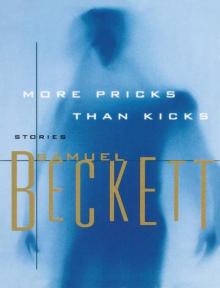 More Pricks Than Kicks
More Pricks Than Kicks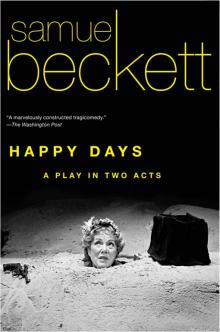 Happy Days
Happy Days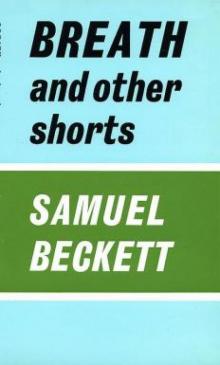 Breath, and Other Shorts
Breath, and Other Shorts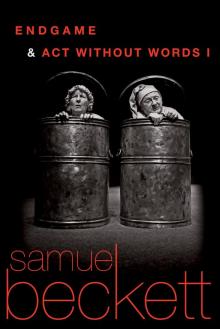 Endgame & Act Without Words
Endgame & Act Without Words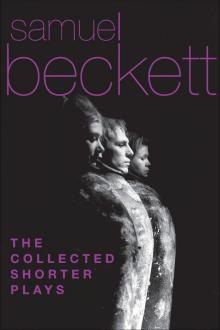 The Collected Shorter Plays of Samuel Beckett
The Collected Shorter Plays of Samuel Beckett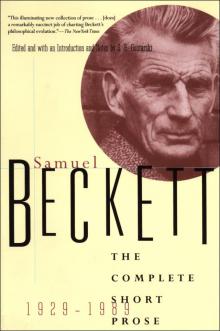 The Complete Short Prose, 1929-1989
The Complete Short Prose, 1929-1989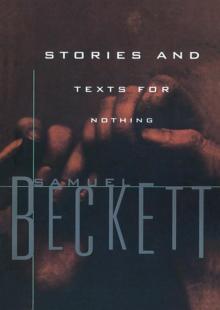 Stories and Texts for Nothing
Stories and Texts for Nothing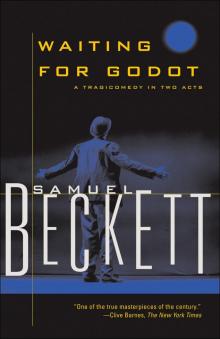 Waiting for Godot
Waiting for Godot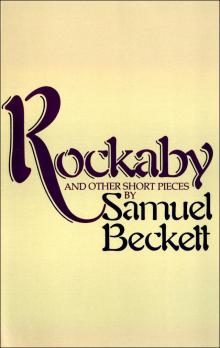 Rockaby and Other Short Pieces
Rockaby and Other Short Pieces First Love and Other Shorts
First Love and Other Shorts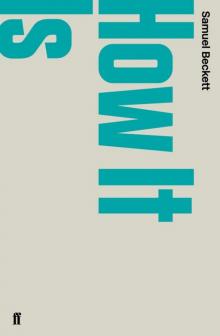 How It Is
How It Is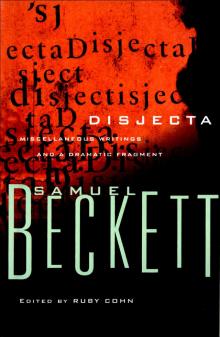 Disjecta: Miscellaneous Writings and a Dramatic Fragment
Disjecta: Miscellaneous Writings and a Dramatic Fragment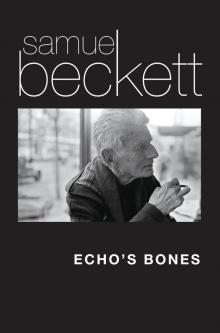 Echo's Bones
Echo's Bones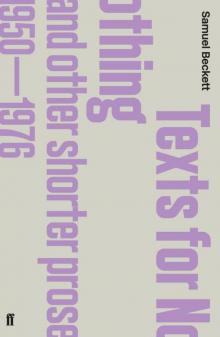 Texts for Nothing and Other Shorter Prose 1950-1976
Texts for Nothing and Other Shorter Prose 1950-1976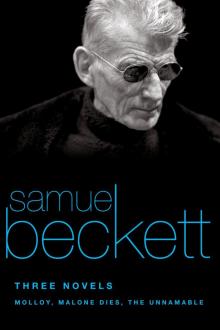 Three Novels
Three Novels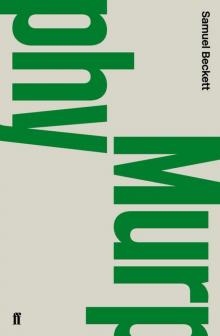 Murphy
Murphy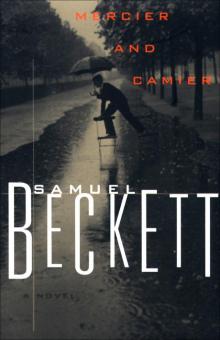 Mercier and Camier
Mercier and Camier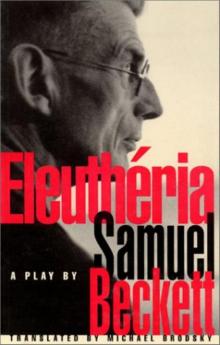 Eleuthéria
Eleuthéria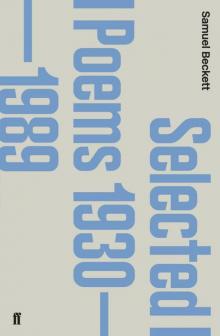 Selected Poems 1930-1988
Selected Poems 1930-1988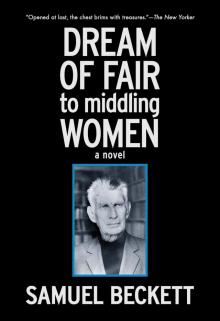 Dream of Fair to Middling Women
Dream of Fair to Middling Women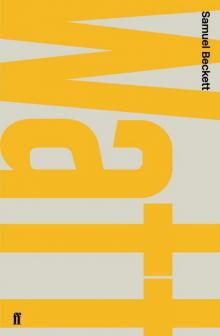 Watt
Watt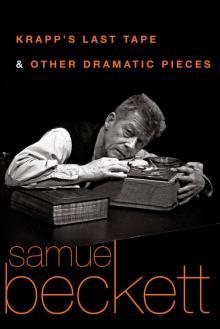 Krapp's Last Tape and Other Dramatic Pieces
Krapp's Last Tape and Other Dramatic Pieces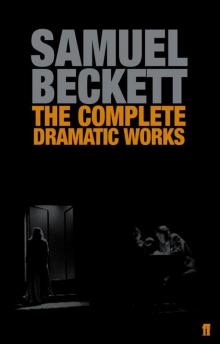 The Complete Dramatic Works of Samuel Beckett
The Complete Dramatic Works of Samuel Beckett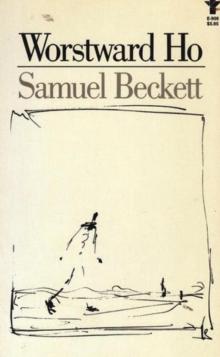 Worstward Ho
Worstward Ho Collected Poems in English and French
Collected Poems in English and French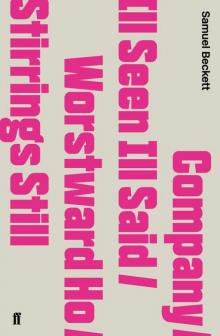 Company / Ill Seen Ill Said / Worstward Ho / Stirrings Still
Company / Ill Seen Ill Said / Worstward Ho / Stirrings Still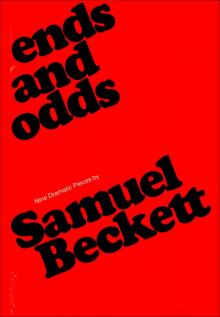 Ends and Odds
Ends and Odds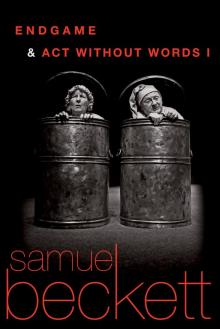 Endgame Act Without Words I
Endgame Act Without Words I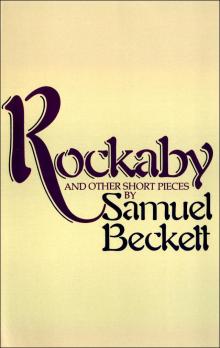 Rockabye and Other Short Pieces
Rockabye and Other Short Pieces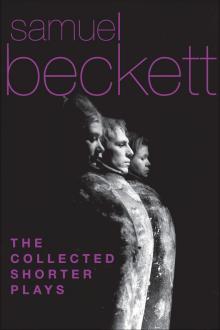 The Collected Shorter Plays
The Collected Shorter Plays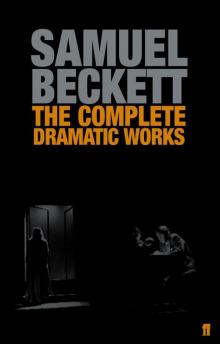 The Complete Dramatic Works
The Complete Dramatic Works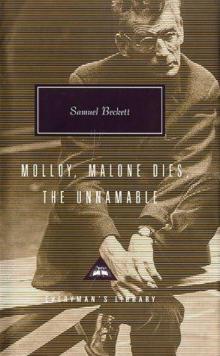 Three Novels: Malloy, Malone Dies, The Unnamable
Three Novels: Malloy, Malone Dies, The Unnamable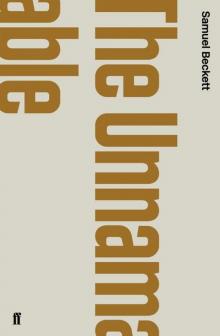 The Unnamable
The Unnamable